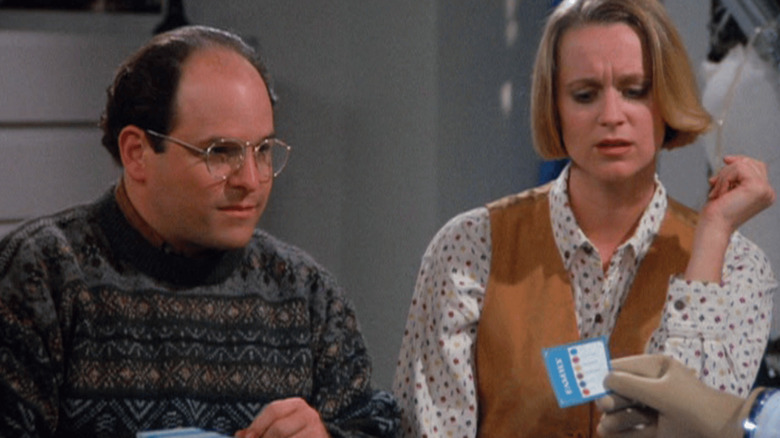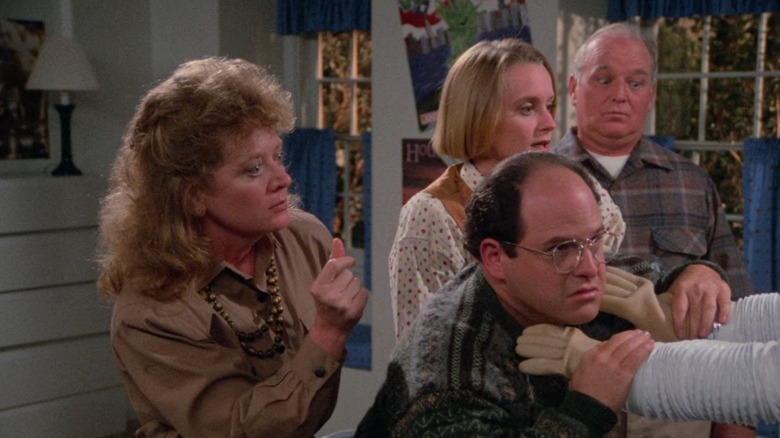Jason Alexander Initially Thought A Classic Seinfeld Episode Was Too Far-Fetched
In the "Seinfeld" episode "The Bubble Boy" (October 7, 1992), George (Jason Alexander), his girlfriend Susan (Heidi Swedberg), Jerry (Jerry Seinfeld) and Elaine (Julia Louis-Dreyfus) go on a road trip to a lakeside cabin in upstate New York belonging to Susan's parents. Before they go, though, Jerry is stopped by a man in a coffee shop who recognizes him (Jerry is a famous comedian in the universe of the show). The man entreats Jerry and his friends to visit his son Donald (Jon Hayman), who would appreciate a visit from a celebrity. Donald is sensitive to germs and has to live in an airtight plastic tent to avoid getting sick. Jerry, being very rude, immediately begins calling the kid "Bubble Boy."
When the road trip finally begins, George is a road warrior, and pushes through the trip as quickly as possible. He arrives at Donald's house early. The extra time forces George and Susan to pass the time by playing Trivial Pursuit with Donald, which is his one true passion. Donald is never seen on camera, but his gloved hands can be seen in frame manipulating a Trivial Pursuit board. Donald, George finds, is incredibly rude and smug, bragging about his trivia skills. George hates him right away, but agrees to play the game. Naturally, George eventually gets defensive, and eventually turns to mocking the boy in the plastic bubble. Did I mention that the characters on "Seinfeld" are all horrible people?
Jason Alexander, as he revealed on the special features for the episode's DVD, kind of hated "The Bubble Boy." The episode came during the show's fourth season, and Alexander felt that it was a little too high-concept for its own good. Most "Seinfeld" episodes were derived from recognizable, everyday neuroses. "The Bubble Boy" was, he felt, officially situational comedy. It was a sign for the actor that "Seinfeld" was failing.
Jason Alexander felt that The Bubble Bay was too high-concept
Here's how Alexander described it on the DVD special features:
"'The Bubble Boy' is the perfect example of everything that you shouldn't be doing. Because first of all, where are we? A bubble boy? We're doing an episode about a bubble boy? Guys! We used to be about little tiny things. A bubble boy? So first of all, the whole concept of the episode seemed wrong to me. Then, who do they cast? They cast our writer, Jon Hayman, a 50-year-old guy [...] who sounds like a 50-year-old guy. We're playing Trivial Pursuit? This isn't ... it's not our show."
Alexander doesn't say it, but he clearly felt the concept was too complex for "Seinfeld," a series that is more typically about everyday foibles and the way horrible people react to them. "Seinfeld" eschewed a lot of traditional sitcom tropes, not least of which was the format's "situational" ethos. The situations on "Seinfeld" were typically non-incidents or banal events. "The Bubble Boy" was, in Alexander's eyes, too extreme. (It did not make our list of the 15 best "Seinfeld" episodes.)
Episode writers Larry Charles and Larry David did find a way into that "everyday" notion in "The Bubble Boy," of course. In the climax of the episode, George finds a typo on one of the Trivial Pursuit cards that reads "The Moops" instead of "The Moors." Because he is losing so badly, he won't let Donald have it, even though he knew the correct answer. George stands his ground, and looks like a complete a-hole in the process. Despite the high concept, there was still a way to bring out George's pettiness. They all live in a hell of their own construction.
Eventually, Alexander came around, admitting that "The Bubble Boy" wasn't so much a "jump the shark" moment as it was a way to push the envelope. "Another great example," he said, "of me wrong, them right." It takes a big man to admit that.

